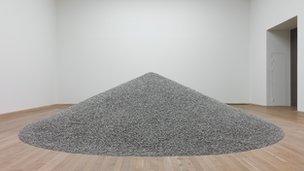Ai Weiwei sunflower seeds bought by Tate
- Published

The work has been purchased for an undisclosed figure
Chinese artist Ai Weiwei's "sunflower seeds" - a work made up of 10 tonnes of porcelain seed replicas - has been bought by Tate Modern.
The London gallery has acquired around eight million of the 100 million porcelain reproductions.
They make up just under one tenth of the original work, commissioned for the Tate's 2010's Unilever Series.
It saw 100 million seeds spread over the floor of the gallery's vast Turbine Hall.
Shortly afterwards it was cordoned off over health and safety fears because of ceramic dust. The gallery initially had plans for visitors to be able to walk on the seeds.
The work was on display at Tate Modern from June 2011 to February 2012.
Each porcelain seed had been individually handcrafted by skilled artisans in the city of Jingdezhen, which is famed for its production of Chinese Imperial porcelain.
The work has been purchased for an undisclosed figure with assistance from the Tate International Council, the Art Fund, and private donations.
It's thought the remaining seeds will go back to the artist.
As well as being a popular Chinese street snack, sunflower seeds have a political meaning for the Chinese artist.
During the Cultural Revolution, propaganda images showed Chairman Mao as the sun and the mass of people as sunflowers turning towards him.
Chinese dissident Ai Weiwei, was recently named as the most powerful person in the art world.
The announcement came after he spent more than two months in detention.
His arrest in April 2011, as he boarded a Beijing flight bound for Hong Kong, prompted a global campaign for his release.
- Published22 June 2011